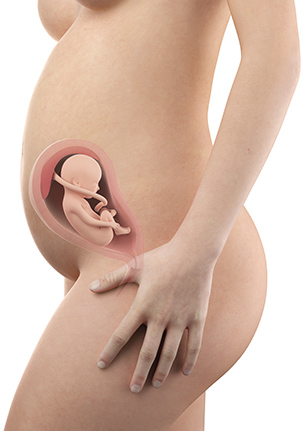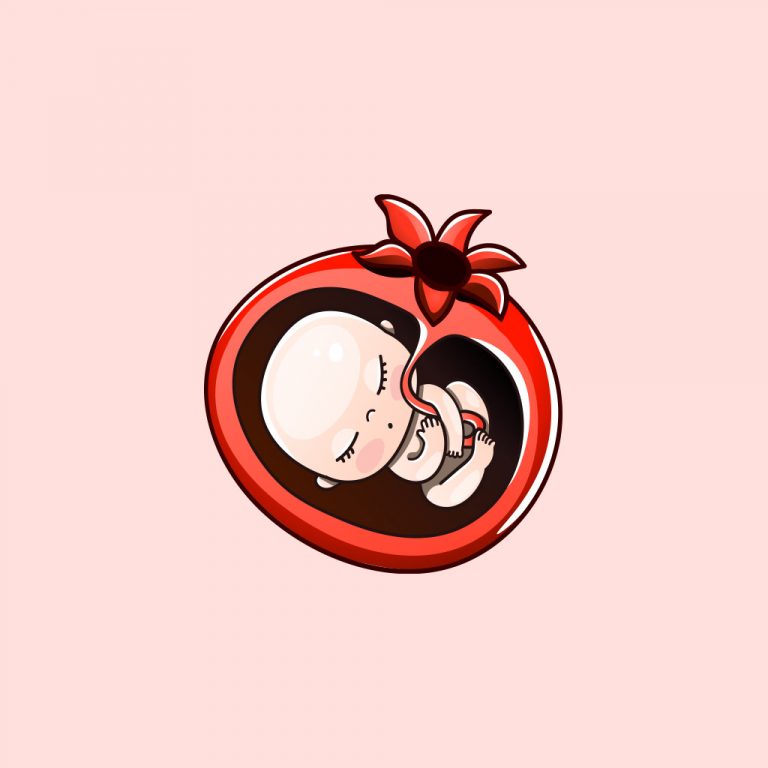Welcome to week 23 of your pregnancy! You’ve made wonderful progress—at this point, you’re well into your second trimester, and both you and your little one are experiencing exciting changes. Your baby is growing more active and starting to look and act more like a newborn every week. You might feel your baby’s gentle kicks and flips become stronger and more noticeable, making this stage especially rewarding.
Physically, you might notice your belly becoming more pronounced and your movements a little slower. That’s entirely normal, as your body is doing the incredible work of nurturing a new life. Some moms find that their appetite increases around this time, while others may experience mild swelling in their hands, feet, or face. These changes can feel surprising, but most are a normal sign that things are progressing as they should.

Your baby is now about the size of a large grapefruit—close to 11 inches long and weighing in at around a pound. Their skin is still quite thin, but it’s becoming less see-through as fat starts to develop. Inside your womb, your baby’s lungs are taking tiny “practice breaths,” even though there’s no air yet. These small details are all signs that your baby is getting ready for life outside, little by little.
It’s also perfectly common to experience new symptoms like backaches or mild leg cramps. Your growing baby shifts your center of gravity and puts extra pressure on your muscles and joints, so it’s important to take breaks, rest when you need to, and give yourself grace. Gentle stretching, supportive footwear, and warm baths can all help soothe discomfort.
As week 23 unfolds, try to focus on self-care and celebrate the amazing job you’re doing. Each day, your baby is learning and changing, and you’re the center of their whole little world. Remember, every pregnancy is unique—if you have questions or concerns, your healthcare team is just a call away, ready to offer guidance and reassurance on this journey.
Your Baby’s Development This Week
At 23 weeks, your baby is making some incredible progress! Picture your little one now about the length of a large carrot—measuring around 11 to 12 inches from head to heel, and tipping the scales at just over a pound. Every day inside your belly, new changes are happening as your baby prepares for life outside.
One fascinating development this week is the creation of your baby’s unique fingerprints and footprints. Tiny ridges are forming on their fingers and toes, setting the stage for the patterns that will be theirs for life. Imagine: the swirls and loops you’ll one day admire are being crafted right now!
This week also brings important changes to your baby’s skin. While still a bit see-through and wrinkly, the skin is slowly thickening as fat begins to build up underneath. This fat will provide warmth and help your baby maintain their body temperature after birth. You might be interested to know that the soft “peach fuzz” called lanugo, which covers their skin, is now darker and more noticeable. This special hair helps protect developing skin until there’s enough fat underneath.
Inside your baby’s chest, the lungs are getting ready for that all-important first breath. A substance called surfactant is being produced now, which will help your baby’s tiny air sacs stay open when they’re born. The blood vessels in the lungs are growing too, making sure your little one will be able to take in oxygen when the time comes.
Your baby’s senses are also waking up in new ways this week. Their tiny ears are now developed enough to catch loud sounds from the world outside the womb—like a dog barking or music playing. Some studies suggest babies can even start to recognize and respond to the sound of your voice, so don’t be shy about talking, singing, or reading to your bump!
One of the most special parts of this stage is how active your baby is becoming. Those wiggles and kicks are only growing stronger and more frequent, and you’ll probably notice them most when you’re resting or lying down. Each movement is a reassuring sign that your baby is thriving and stretching their growing muscles.
- Tip: Try gently pressing your hand on your belly or playing soft music—some mothers find their baby “dances” right along!
- Did you know? Rapid eye movements start around this time, suggesting your baby is even experiencing the first glimpses of dream sleep.
- What to watch: Patterns in movement will become clearer in the coming weeks. If you ever notice a big drop in activity, remember to check in with your care provider for peace of mind.
As you move through week 23, celebrate these amazing changes. It’s a beautiful reminder that, with every passing week, your baby gets ready for their grand entrance—and you’re nurturing them every step of the way.
Changes in the Mother’s Body
Reaching 23 weeks brings a variety of new changes and sensations as your pregnancy progresses. Every woman’s experience is unique, but there are some common themes you might notice in your body during this exciting stage. Let’s explore what you can expect and how to care for yourself right now.
Growing Belly and Weight Gain
Your baby is getting bigger and so is your belly! By this point, your uterus is about the size of a soccer ball and sits above your belly button. It’s normal to have gained around 10–15 pounds so far, although every woman’s weight gain is a bit different. You may notice your belly feels tighter, and old clothes may no longer fit comfortably. It’s a great time to invest in soft, supportive maternity wear.
Stretch Marks and Skin Surprises
As your skin stretches, you might see new stretch marks—these can be pink, purple, or even silver lines on your belly, breasts, hips, or thighs. Remember, they are completely normal and many women experience them. Some moms also notice their palms turn reddish, or that a dark line (linea nigra) appears down the center of the belly. You might develop small, harmless skin growths called skin tags, especially in areas where skin rubs together. Moisturizing can help relieve itching, but most of these changes fade or disappear after pregnancy.
Swelling and Vein Changes
It’s common to have a bit of swelling in your ankles and feet, especially if you’ve been standing for a while. Try putting your feet up when you can and changing positions frequently. Some moms see blue or purple veins appear on their legs—these are called varicose veins and are caused by extra blood flow. Wearing supportive socks and moving around throughout the day can ease discomfort.
Physical Discomforts
- Backaches: As your center of gravity shifts, you might notice lower back pain. Gentle stretching or prenatal yoga can provide relief. Remember to bend from your knees when picking things up.
- Leg Cramps: Nighttime leg cramps are common now. Stretching your legs before bed and staying hydrated can help reduce these uncomfortable spasms.
- Heartburn and Indigestion: Hormonal shifts and your growing baby may slow digestion. Eating smaller, more frequent meals and avoiding spicy or greasy foods can make a noticeable difference.
Changes in Your Sleep
It’s not unusual to have trouble sleeping well at this stage. Between trips to the bathroom, leg cramps, and a growing belly, restful nights can be tough. Try resting on your left side with a pillow between your knees and under your belly for added comfort. This position also supports healthy blood flow to your baby.
Practice Contractions
You may start to notice brief tightening in your belly—these are known as Braxton Hicks contractions. They tend to be irregular and mild, helping your body get ready for labor later on. If they become regular, painful, or do not go away, call your healthcare provider to make sure everything is okay.
Your Emotional Well-being
Finally, remember that changes in hormones and physical discomforts can affect your mood. It’s completely normal to feel a mix of excitement, anxiety, and even a bit of frustration. Take time each day to relax and do things that bring you joy. Reach out to your partner, friends, or a healthcare provider if you need support—caring for your emotional health is just as important as caring for your body.
Your body is doing amazing work as it helps your baby grow. Celebrate these changes and be gentle with yourself. If you ever feel unsure or notice anything that doesn’t feel right, trust your instincts and contact your doctor or midwife—they’re there to support you every step of the way.
What Medical Checkups and Screenings Do I Need at 23 Weeks?
Reaching the 23rd week of pregnancy is a big milestone! This is a great time to focus on the special checkups and tests that help keep both you and your baby healthy as the second trimester moves along. Let’s break down what you can expect during your doctor visits and how these screenings support your growing family.
- Regular Prenatal Appointments: At this stage, you’re typically seeing your provider about once a month. These visits are a chance to discuss any new symptoms, ask questions, and monitor the progress of your pregnancy. Your doctor or midwife may:
- Measure your belly to check your baby’s growth
- Listen for your baby’s heartbeat
- Ask about fetal movement – your baby’s kicks and rolls matter!
- Check your blood pressure and weight
- Urine Tests: Each visit often includes a quick urine sample. This test checks for signs of high sugar or protein levels. Catching these early can help identify conditions like gestational diabetes or preeclampsia before they become serious.
- Possible Blood Tests: Depending on your personal history and local guidelines, you might have some routine blood work. Around this time, many providers screen for anemia (low iron) and your blood type, and may double-check for immunity to certain infections.
- Talking About Your Baby’s Movements: As you start noticing more kicks and flutters, it’s helpful to let your provider know what you’re feeling. Patterns can vary, but big changes—like much less movement—should be mentioned right away. Your care team can offer tips on how to pay attention to these “baby signals.”
- Discussing Any New Symptoms: Your comfort and health are important! Things like bad headaches, unusual swelling in your hands or face, changes in eyesight, fever, or bleeding aren’t just everyday complaints—they’re signs to contact your provider. Always ask if you’re unsure; there are no silly questions in pregnancy care.
- Looking Ahead to Upcoming Screenings: Soon, you’ll likely have a glucose screening test to check for gestational diabetes (usually scheduled between weeks 24 and 28). Ask your doctor when yours will happen so you can be prepared—sometimes, it means having a sweet drink and a little extra time at your appointment.
Every step of these checkups is designed to catch small issues before they become big ones. Don’t be shy about asking questions or sharing how you’re feeling—your healthcare team is here to support you. Keeping up with these appointments is one of the best ways to care for yourself and your baby as you move past the halfway mark!
Nutritional Tips and Physical Exercise
Taking care of your body through good nutrition and gentle exercise can make a big difference for both you and your baby this week.
Here are some practical tips tailored for moms at 23 weeks:
- Choose power-packed snacks: Reach for snacks that are both filling and nourishing, like a banana with peanut butter, a small bowl of yogurt with berries, or a handful of unsalted nuts. These options help keep your energy steady and provide important nutrients.
- Enjoy colorful meals: Try filling your plate with fruits and veggies of different colors — think red bell peppers, green spinach, deep orange carrots, and purple grapes. The variety isn’t just pretty; it means you’re getting a wide range of vitamins and minerals.
- Mind healthy fats: Healthy fats are key for baby’s brain growth. Add avocado slices to salads, sprinkle chia or flaxseed into smoothies or cereals, and opt for grilled fish like salmon or sardines when you can.
- Support with whole grains: Swap out regular bread or pasta for whole wheat, brown rice, or oats when possible. Whole grains release energy slowly and help with digestion, which can ease constipation common in pregnancy.
- Stay steady on hydration: Carry a water bottle with you and take sips often, even if you’re not very thirsty. If plain water is unappealing, add a slice of lemon, lime, or cucumber for a refreshing twist.
- Remember iron boosters: To help your body absorb iron, pair iron-rich foods (like lean beef, spinach, or beans) with something high in vitamin C, such as oranges, strawberries, or raw bell pepper.
Physical activity during pregnancy doesn’t have to be intense to be beneficial. Moving your body helps with circulation, eases aches, and supports a healthy mood:
- Walk when you can: Even a 15–20 minute walk around your neighborhood or local park can improve your energy and help reduce swelling in your legs and feet.
- Gentle stretching: Take a few minutes daily to stretch your back, legs, and shoulders. Pregnant-friendly yoga videos or classes are a great way to improve flexibility and relax.
- Swimming or water exercise: If you have access, swimming takes pressure off your joints and helps keep you cool. Many expectant mothers find floating in the pool very soothing.
- Pelvic floor exercises: Practicing Kegels regularly supports your pelvic muscles, which can help both during pregnancy and after your baby is born.
- Listen to your body: It’s normal to get tired more easily now, so be gentle with yourself. If you ever feel dizzy, short of breath, or have pain, rest and let your healthcare provider know.
If you’re unsure what’s safe for you, ask your doctor or midwife for personalized advice, especially before starting new activities. Remember — making small, positive choices each day adds up. Taking care of yourself is one of the best gifts you can give your baby.
Weekly Checklist
At 23 weeks, your little one is growing quickly and your body is going through so many amazing changes. Here’s your gentle and practical checklist for Week 23 to help you stay informed and comfortable, and to encourage a healthy pregnancy journey:
- Connect with Your Baby: Take a few minutes each day to rest quietly and notice your baby’s kicks and wiggles. Try playing soft music or gently talking to your belly—your baby may even recognize your voice now!
- Update Your Wardrobe: Your bump is getting bigger, and comfort matters! Consider picking up a few stretchy, supportive pieces of clothing or comfortable flat shoes to help ease swelling and prevent aches.
- Support Healthy Skin: Moisturize your belly and sides daily to soothe any itching and help with stretch marks. If you notice new skin changes, like the “linea nigra” on your abdomen or tiny skin tags, remember these are very common.
- Focus on Heartburn Relief: If heartburn is bothering you, try eating smaller meals more often and avoid lying down right after eating. Sleep with your head slightly elevated for extra comfort.
- Prioritize Leg and Foot Care: Your legs may feel tired or swollen at the end of the day. Elevate your feet when sitting, wear loose socks, and gently stretch your legs to ease cramps and boost circulation.
- Drink Water Often: Keep a water bottle nearby and sip throughout the day. Staying hydrated can help your skin, support growing blood volume, and keep digestion moving smoothly.
- Prepare for Sleep Challenges: Sleeping comfortably can be harder now, so experiment with pillows between your knees or behind your back. Try going to bed at the same time each night to help your body settle into a restful routine.
- Schedule Your Next Prenatal Visit: Check your calendar to make sure you’re up-to-date on prenatal appointments. Bring any new questions or notes about your baby’s movement patterns or your symptoms to discuss with your doctor or midwife.
- Review Your Eating Habits: Take a moment to look at what you’re eating each week. Are you getting enough fruits, veggies, iron-rich foods, and calcium? If you’re unsure, jot down a food journal to review at your next appointment.
- Try Gentle Movement: If you feel up to it, add gentle movement to your day—like a short walk, pregnancy yoga, or slow stretches. Listen to your body, and stop if anything feels uncomfortable.
- Notice Emotional Well-being: This is a time of excitement but it’s normal to feel anxious or have mood swings. Take breaks for yourself, talk with supportive friends or family, or try relaxation techniques like deep breathing when you need a moment to recharge.
- Stay Informed: Read up on what to expect in the next few weeks, especially about signs of preterm labor or when to call your doctor. Knowing what’s normal helps you feel prepared and confident as you move forward.
Remember, every pregnancy is unique. Trust yourself, ask for help whenever you need it, and cherish these special weeks as your baby continues to grow!
When to Call Your Provider
Your comfort and your baby’s wellbeing are always important. Although many week 23 changes are perfectly normal, some signs may mean you need an extra check-in with your healthcare provider. It’s always better to reach out if you’re concerned — your doctor truly wants to support you. If you notice any of the following, don’t hesitate to give your care team a call:
- Sudden or severe swelling in your face, hands, or around your eyes — especially if it comes on quickly or is much more than mild ankle swelling.
- Vision changes like dimming, flashing lights, blurriness, or seeing spots that don’t go away.
- Strong headaches that last for several hours or don’t improve with rest, fluids, or usual remedies.
- Vaginal bleeding, whether light spotting or a heavier flow, should always be checked out just in case.
- Painful or burning urination, which could point to a urinary tract infection — these need quick treatment during pregnancy.
- Leaking fluid from the vagina (could feel like constant dampness or a rush of water), which might mean your water broke early.
- Regular abdominal cramps or tightening that happen more than four to six times an hour, or are accompanied by pressure in your lower pelvis or back.
- Noticeably less baby movement than usual once you’ve started feeling kicks and wiggles. If your little one’s activity seems much quieter, check in for reassurance and guidance.
- Fever above 100.4°F (38°C) that won’t go away or is accompanied by chills, body aches, or other signs of illness.
- Severe or sharp pain in your belly, chest, or side that doesn’t improve or feels different from the usual aches and stretching.
- Persistent vomiting that makes it hard to keep food or liquids down, leading to signs of dehydration (like dry mouth or peeing much less than normal).
- Feeling suddenly very short of breath, dizzy, or faint, especially if paired with chest pain or a racing heartbeat.
Always remember: if something doesn’t feel right or feels worrying to you, it’s perfectly okay to give your provider a call. Trust your instincts, and know that no question is too small when it comes to your health and your baby’s safety.
Preparations for Baby
As you reach Week 23, your baby’s arrival feels a little closer each day! Now is a great time to start getting both your heart and your home ready for parenthood. These small steps can help you feel more confident and connected as you count down the weeks ahead:
- Make Room for Baby: Start thinking about where your baby will sleep. Whether it’s setting up a crib, bassinet, or co-sleeping space, even little steps—like clearing out a dresser drawer or corner—can help you feel prepared without overwhelming you.
- Begin a Baby List: Make a checklist (on your phone or notebook) of essentials—like diapers, wipes, a few basic clothes, and a safe car seat. You don’t need it all at once; jot down things as you think of them.
- Practice Self-Kindness: Remember, every feeling is valid—excitement, nervousness, even moments of doubt. Take a few minutes each day to relax, breathe deeply, and remind yourself you’re doing great.
- Start Gathering Support: If you haven’t already, share your news (and any anxieties) with a close friend or family member. Ask someone you trust to be your “on-call” person for when you need help or just a friendly voice.
- Enjoy Gentle Bonding: Set aside time to talk, sing, or read to your baby—you might be surprised how soothing these routines can become for both of you. Some moms like to play their favorite music or simply rest a hand on their belly and daydream about who their little one will be.
- Look Ahead Without Pressure: Browse baby names, nursery decor, or parenting books if you feel inspired, but don’t stress if you’re not ready. Curiosity is enough—you don’t have to make big decisions this week.
- Keep Essentials Nearby: Place a water bottle and healthy snacks by your bed or favorite chair to help with those random hunger pangs or fatigue, and keep a notebook handy for any questions you want to ask your provider at your next visit.
Remember, preparing for the baby is about small, gentle steps—emotionally and practically. Celebrate each little accomplishment, trust yourself, and reach out when you need support. You’re building a loving home already, one day at a time!
Citations and References
- American College of Obstetricians and Gynecologists (ACOG) – Offers clinical guidelines on prenatal visits, symptom monitoring, nutrition, and preeclampsia screening during mid-pregnancy. Visit Source
- Mayo Clinic – Provides specific week-by-week fetal development milestones, common maternal symptoms, and evidence-based prenatal health advice for Week 23. Visit Source
- Cleveland Clinic – Details changes in pregnancy at 23 weeks, covering baby growth, maternal symptoms, and nutritional needs. Visit Source
- Centers for Disease Control and Prevention (CDC) – Gives essential guidance on prenatal nutrition, the importance of folic acid, and pregnancy health monitoring. Visit Source
- National Institutes of Health (NIH) – MedlinePlus – Summarizes pregnancy week-by-week progress, fetal development, and standard prenatal screening recommendations. Visit Source
- World Health Organization (WHO) – Recommends best practices for antenatal care, nutritional supplementation, and well-being for mother and baby. Visit Source
- WebMD – Features an overview of maternal and fetal changes expected at 23 weeks and suggestions for managing common symptoms. Visit Source
- BabyCenter – Offers a week 23 pregnancy guide explaining fetal milestones, maternal changes, and self-care tips. Visit Source










